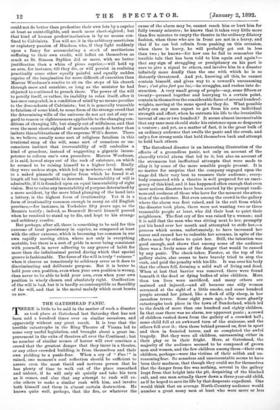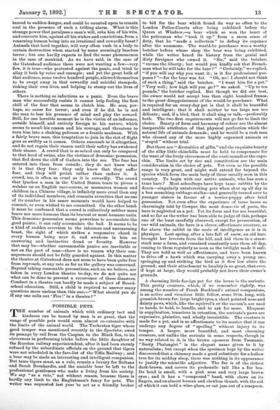THE GATESHEAD PANIC.
THERE is little to be said in the matter of such a disaster as took place at Gateshead last Saturday that has not been said a hundred times over on similar occasions, and apparently without any great result. It is true that the terrible catastrophe in the Ring Theatre of 'Vienna led to some very useful legislation, and brought about a great im- provement in the exits of theatres all over the Continent ; but no number of similar scenes of horror will ever" convince a crowd that the greatest danger that they incur in a theatre, or any other crowded building, is from themselves and their own yielding to a panic-fear. When a cry of " Fire !" is raised, one moment's cool reflection should be sufficient to assure even the most timid and nervous person that he has plenty of time to walk out of the place unscathed and unhurt, if he will only sit quietly and take his turn as it comes, and also that any attempt to rush will ex- cite others to make a similar rush with him, and involve both himself and them in almost certain destruction. He knows quite well, perhaps, that the fire, or whatever the
cause of the alarm may be, cannot reach him or hurt him for fully twenty minutes ; he knows that it takes very little more than five minutes to empty the theatre in the ordinary dilatory fashion, when those who are in front are not in a hurry, and that if he can but refrain from pushing on this occasion, when there is hurry, he will probably- get out in less than two ; he knows—for how can he fail to remember the terrible tale that has been told to him again and again ?— that any sign of struggling or precipitancy on his part is Rare to give a signal to others, and involve him in a disaster infinitely more deadly than the one with which he is so distantly threatened. And yet, knowing all this, he cannot contain himself, and gives way to a coward's unreasoning fear; c'est plus fort que lui,—he struggles, and rushes into de- struction. A very small group of people—say, some fifteen or twenty—pressed together and hurrying to a certain point, contain in themselves the considerable force of several hundred- weights, moving at the same speed as they do. What possible safety can any man expect to get from his own individual strength and effort, when he entrusts his life to the irresistible torrent of .one or two hundred ? It seems almost inconceivable that any sane man should stake his existence upon so desperate a venture ; and yet, as a matter of fact, it is the great bulk of an ordinary audience that swells the panic and the crash, and only a few strong souls that hold themselves back and attempt to hold back others.
The Gateshead disaster is an interesting illustration of the effects of a groundless panic, not only on account of the absurdly trivial alarm that led to it, but also on account of the strenuous but ineffectual attempts that were made to allay it by some of the more sensible people present. It is no matter for surprise that the company engaged upon the stage did their very best to reassure their audience ; every- body connected with a theatre is well prepared for an emer- gency of this kind, and it has happened often enough that even more serious disasters have been averted by the prompt readi- ness and coolness of those who have for the moment the atten- tion of the audience. But even among the crowd in the gallery where the alarm was first raised, and in the exit from which the disaster took place, there were not wanting two or three reasonable people at least, who did their best to quiet their neighbours. The first cry of fire was raised by a woman; and it is said that the man who was sitting next to her, promptly put his hand over her mouth and attempted to stifle her,—a process which seems, unfortunately, to have increased her terror and caused her to redouble her screams, in spite of the efforts made by others to quiet her. Still, the intention was good enough, and shows that among some of the audience there was a lively sense of the danger that would be caused by any panic. The check-taker, Forster, at the top of the gallery stairs, also seems to have bravely tried to stop the rush, and paid the penalty with his life. It was over his body that the others fell, forming a solid wall of living and dead. When at last that barrier was removed, there were found beneath it the dead or dying bodies of nine children. More than ten lives were sacrificed, and many others are maimed and injured,—and all because one silly woman screamed at the sight of a little smoke, and some hundred people around her joined, like a flock of silly sheep, in her causeless terror. Some eight years ago, a far more ghastly catastrophe took place in the town of Sunderland, which led to the death of more than one hundred and eighty children. In that case there was no alarm, nor apparent panic ; a crowd of children rushed down from the gallery of a crowded hall ; some child fell at an awkward turn of the staircase, and the others fell over it; then those behind pressed on, first in sport and then in frenzied terror, and so completed the awful tragedy. But they were all children, unreasoning either in their play or in their fright. Here, at Gateshead, the majority of the audience seemed to be composed of grown men and women, and the few children among them—their own children, perhaps—were the victims of their selfish and un- reasoning fear. So senseless and unaccountable seems to have been their madness, that though they could see for themselves that the danger from fire was nothing, several in the gallery leapt from that height into the pit, despairing of the blocked exit, and one man actually threw down a three-year-old child, as if he hoped to save its life by that desperate expedient. One would think that an average North-Country audience would number a great many men at least who were more or less inured to sudden danger, and could be counted upon to remain -cool in the presence of such a trifling alarm. What is this strange power that paralyses a man's will, robs him of his wits, and converts him, against all his wishes and convictions, from a -reasoning human being into an irrational and cowardly beast P Animals that herd together, will very often rash in a body to certain destruction when started by some seemingly baseless terror ; bat one hardly expects to find the same phenomenon in the case of mankind. As we have said, in the case of the Gateshead audience there were not wanting a few—very few, it is true—who protested against the panic, and tried to allay it both by voice and example ; and yet the great bulk of that audience, some twelve hundred people, allowed themselves to be swept away in that cowardly and suicidal stampede, risking their own lives, and helping to stamp out the lives of others.
There is nothing so infectious as a panic. Even the brave man who successfully resists it cannot help feeling the first -chill of the fear that seems to clutch him. He sees, per- haps, no cause for terror ; and even if he did, he is not -the man to lose his presence of mind and play the coward. Still, for one horrible moment he is the victim of an influence, -outside himself, and entirely foreign to his nature, which seems to numb his reason and his courage, and threatens to turn him into a shaking poltroon or a frantic madman. With a fairly brave man, this temptation to join in the riot of flight goes as swiftly as it comes. Others succumb to it altogether, and do not regain their reason until their safety has awakened their shame. A crowd that is so seized can only be compared to that herd of swine, also the victims of demoniac possession, that fled down the cliff of Gadara, into the sea. The fear has entered into them from outside ; they do not know what it is that they fear ; they only know that they suffer fear, and they will perish rather than endure it. A -crowd, too, is often as cruel as it is cowardly. The crowd that lynches a man in the United States, tears to pieces a welsher on an English race-course, or massacres women and children in a Chinese village, is infinitely more cruel than any of its individual members, and commits atrocities that no one of its number in his saner moments would have helped to commit, or even wished to see committed. On the other hand, it must be confessed that a crowd is collectively neither more brave nor more humane than its bravest or most humane units. This demoniac possession seems powerless to accumulate the good points ; it can only accumulate the bad. It seems to be a kind of sudden reversion to the inhuman and unreasoning beast, the sight of which strikes a responsive chord in -every human being near it, and awakens in him an -answering and instinctive dread or ferocity. However that may be—whether unreasonable panics are inevitable or not on the part of man—there is no reason why their con- sequences should not be fully guarded against. In this matter the theatre at Gateshead does not seem to have been quite free from reproach, at any rate as far as the gallery was concerned. Beyond taking reasonable precautions, such as, we believe, are taken in every London theatre to-day, we do not quite see -what can be done to prevent a recurrence of these disasters. 'Conduct in a theatre can hardly be made a subject of Board- school education. Still, a child is required to answer many questions more useless than this one,—" What should you do if any one calls out Fire !' in a theatre P"















































 Previous page
Previous page